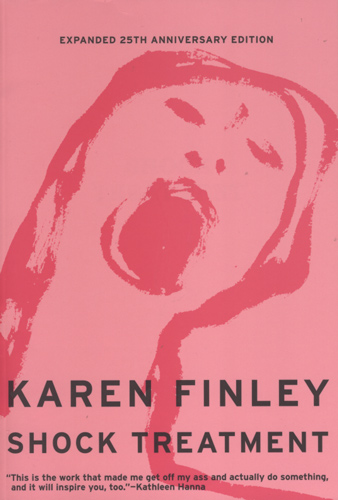Shock Treatment
If reading about bodily functions, bodily excretions, or strange items put into body orifices offends you, be forewarned, they’ll clobber you in Shock Treatment, the 25th anniversary reissue of Karen Finley’s 1990 book.
If reading about bodily functions, bodily excretions, or strange items put into body orifices offends you, be forewarned, they’ll clobber you in Shock Treatment, the 25th anniversary reissue of Karen Finley’s 1990 book.
I wanted to read this book because I knew Finley was critical of the government’s response to the AIDS epidemic. It seems everyone knew someone affected by AIDS. In my case it was my brother. But Finley’s advocacy is more widespread than just one cause. She also rails against those who stepped on artistic freedom, civil rights, free speech and more.
Finley’s ink drawings, which are displayed in the Pompidou Museum in Paris and the Museum of Contemporary Art in Los Angeles, set the tone on the book’s cover and within. The poetry and prose in Shock Treatment are collected from Finley’s live performances. Among those I can quote—and a good introduction to her work—are these lines from “Sushi Party”:
Doctor, you touched my vertebrae and you are touching my
unpaid bills, touching my unmade marriages. And you look at me
and say, “Have you ever had shock treatment?”
And I say, “Doctor, life is a shock treatment.”
Finley tackles incestuous rape and the cruelties that people inflict on others. She freely mentions her parents in nice and not nice ways. Some portions of her monologues are obviously fiction, but you’re left wondering what’s true and what’s said for artistic effect, so prepare for some confusion.
One of Finley’s more famous poems, “The Black Sheep,” is immortalized on a bronze plaque in New York City. It addresses AIDS and a number of other issues, and begins with two people talking after a funeral:
He said I’ve made a vow—
I only go to death parties if I know someone
before they were sick.
Why?
[ . . . ] ‘cause I never knew their lives
and now I only know their deaths
And because we are members of the
Black Sheep family.
In her introduction to this anniversary edition, Finley talks about her early performances that were condemned. “Breaking taboos came at a cost to me. I was feared, attacked [ . . . ] My work was brought to the floors of congress, on the front pages of daily newspapers.” And now? “The threat of censorship still exists.”
Her stage performances and book were influential in shattering the complacency that existed in the 1990s when “the nation was in the midst of the culture wars,” she writes. She and three other artists
had been selected by the National Endowment of the Arts to receive grants for solo performances but they were then removed because of “indecency.” The sexual panic and hysteria that erupted from this government decision sparked further anxieties about otherness, sexual identity, and the performance of gender fluidity. Eventually we brought that case to the Supreme Court of the United States, Finley vs. National Endowment of the Arts.
Here are two diverse sentences that only hint at the intensity of Finley’s writing. From “Two Stories”: “Joanne sleeps with a gun under her pillow because every time she has intercourse with her husband he defecates uncontrollably as he has an orgasm.” And this in “White Man’s Guilt”: “We all walked back to the car, drove back to the hotel, and we were all feeling the same thing—White Man’s Guilt. Guilt for giving a truck and a house with no plumbing to every American Indian family.”
These are softer lines from “Summer Vacation.” Keep in mind this was originally performed in the 90s:
Last week I spotted tourists in Bloomingdale’s videotaping their purchases at the make-up counter. How stupid and boring can you be? Doesn’t anyone have a memory anymore?
I don’t document every emotional event in my life because then I couldn’t lie about it later.
I’ve presented just a sampling of the work in Shock Treatment. If four-letter words, gross vignettes, and super strong stuff shocks you, then skip this book. For the rest of you, consider this a teaser.





